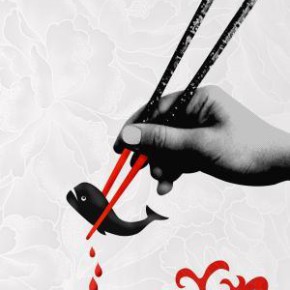The whaling issue is not that black and white; there’s more to ‘the whale’ than the whale alone. Why did the Japanese start whaling? And why didn’t they stop? Why are most environmental campaigns directed against Japan and not against other whaling nations? Why, in the eyes of the West, did the whale go from canned food to cherished creature?
Whales appear to evoke strong feelings all over the world. Issues that concern whaling consistently make the headlines; and it goes beyond that. Not only did the whaling discourse produce articles, stickers, advertisements, films and songs, there even exists a flourishing business in the manufacturing of T-shirts saying: “Save the Whales, Harpoon a Honda”, or “Save the Whales, Eat Hello Kitty Instead” (De President 2010; Red Bubble 2010). The whaling issue is very much alive in international affairs, popular culture, environmental circles and in the academic world.
The Western world has grown so accustomed to the current anti-whaling norm, that one would almost forget that things used to be different before. Actually, there has been a dramatic swift from a world where the hunt for whales was widespread and undisputed to one where it is morally wrong, and the ones who do so are frowned upon (Epstein 2008, vii). These changing international norms are influenced and constructed by cultural identities. In the process, Japan has been put into an outlaw position.
Identity matters to international relations (2008, 5). International society is a world full of ‘Selfs’ and ‘Others’- relations that are constructed. In this way, our relation to the whale is socially constructed as well. Here, the anti- and pro-whaling debate will be explored focusing on the why’s and how’s, essentially demonstrating that there is more to the whaling debate than whales alone.
The first chapter travels through time to respectively highlight the (historical) construction of Western and Japanese relations to whaling and how this has resulted in the current state of affairs. The second chapter explores the anti- and pro-whaling discourses and how they have become alive in (popular) culture. The last chapter seeks to break down the whaling issue to see what is really behind it, and essentially, wander through the way in which national identities and international relations are intrinsically linked to each other. In the eye of this hurricane, we find the whale.
Interested? Please see the entire text in the PDF below.




